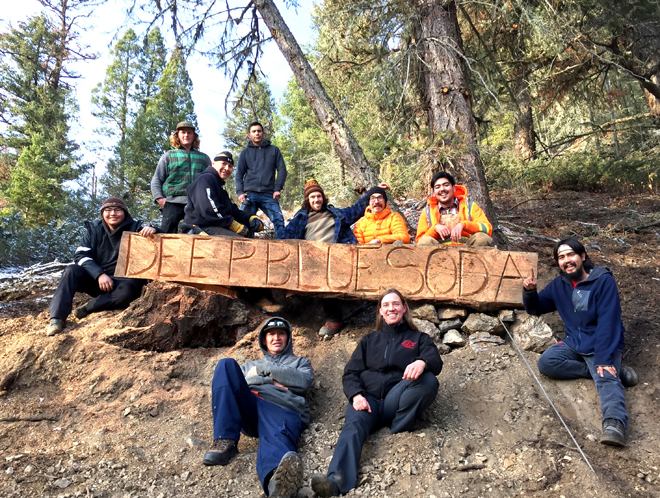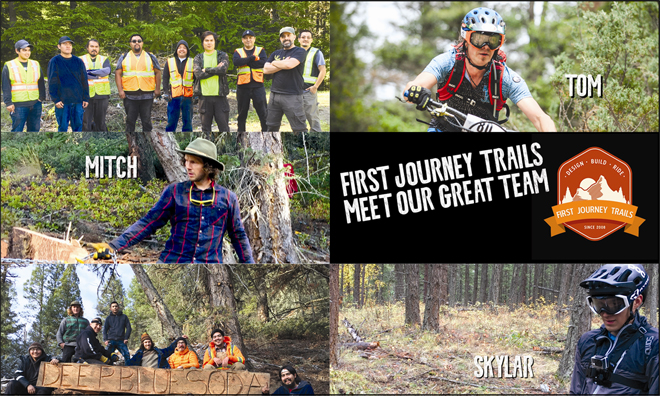By LeRae Haynes –
Making a very successful wilderness program even better in the Cariboo-Chilcotin is on the table, thanks to the creative insight of Patrick Lucas and Thomas Schoen. The focus is kids, mountain bikes, loving the wilderness, and supporting communities impacted by last summer’s wildfires.

The Trails to Recovery and Resilience Training and Capacity Building program has been in place for about four years, and it is now poised to take on an even more meaningful vision.
Thomas Schoen, trail builder and entrepreneurial tourism advisor, is a native of Germany. He immigrated to BC in 1993 and assisted in establishing the award winning Xat’sull First Nation Heritage Village as one of the province’s premier Indigenous tourism sites. He has successfully operated numerous tourism businesses including two in the Barkerville historic site: The St. George Hotel and McMahon’s Confectionery.
In May 2007, Thomas’ life changed when he bought his first downhill mountain bike. He started building mountain bike-specific trails with an emphasis on large wooden technical trail features. He sold his businesses and started building trails full-time in 2009. As a director for the Aboriginal Youth Mountain Bike Program, Schoen has successfully trained numerous Indigenous youth trail crews that have built numerous high-quality nature trails all over the province.
Patrick Lucas is an award-winning registered professional planner, a settler, and an aspiring ally to Indigenous communities. He is passionately committed to fostering and supporting authentic reconciliation and the unsettling of Turtle Island. Over the past 15 years Lucas has had the honour of working alongside Indigenous mentors and teachers learning the pathways to build relationships between First Nations and non-First Nations based on trust and respect. As the founder and director of the Aboriginal Youth Mountain Bike Program, Lucas has assisted numerous communities to develop trails, recreation, and tourism plans leading to enduring social and economic development.
Schoen said while working as a consultant and planner for First Nations communities, he started seeing the need to engage First Nations youth in outdoors and sports activities.
“We work within the mountain bike industry and we thought this would be fitting,” Schoen explained. “It combines trail building, basic bike repair skills, and basic mountain biking skills.”
The response has been absolutely amazing. “We work with dozens and dozens of First Nations communities all over the province and are swamped with requests from Vancouver Island to the Fraser and including places like Terrace and Smithers,” he said. “It’s a huge need; both the programs and the funding are growing, and we’re pulling more and more people in to work with us.”
He said they’ve pooled resources and received grants and corporate sponsorships. “This year we’re going to take it to the next level, and our big proposed project this year is in partnership with the Red Cross.”
This project involves communities affected by wildfires: all First Nations communities around Williams Lake, 100 Mile House, Quesnel, and the Chilcotin. “It’ll be the same thing we’ve done in the past: riding with the kids, and doing trail building clinics, bike repair, and community barbeques,” said Schoen.
“This has a very positive social aspect to it, too, and not just for the youth, but for everyone on reserve,” he added. “They see a couple of non-native dudes there to offer a service to their youth and everyone’s so welcoming and friendly.”
He added that there’s a strong cultural component. “We really try to have a bit of exchange going on—they’re not the only ones learning. The elders come out and teach us a bit about their culture and traditions, maybe do a sweat lodge,” he continued.
“So many doors open up: we might build on some of their traditional trails. It’s truly an exchange.”
He said it’s about building relationships. “We believe it’s part of reconciliation in our province,” he added. “An interesting aspect is that suddenly these areas are open to the public and people are enjoying the wilderness together.”
For many years working as a First Nations consultant, Schoen has tried to achieve these same goals through tourism. He said that can be a bit of a tough sell sometimes. “In this case, though, it just opened doors easily—opened hearts in the community with the kids and the youth with a non-threatening approach.”
This could grow, he said, from these clinics to economic development for these communities.
They present a range of clinics, from a day to a week. “We may plan a big event at the end of the wildlife recovery bike program: maybe bring all the kids together on a larger scale this year,” he said, adding that if they can get the funding in place, they can get this program going in June or July.
“Holding these clinics in the areas where the wildfires happened is the best way to invest in my community, the best way to spend my volunteer time in the area where I live,” he explained. “It’s instant gratification, kids smiling all day long, and the joy you bring to a community: it’s amazing.”
He said so much was taken away during the wildfires last summer—the resources around these communities. “Trails are such a good way to get into the wilderness and invest in your surroundings,” said Schoen. “It’s a step toward rebuilding and it’s investing in something that was destroyed and will grow again.”
LeRae Haynes is a freelance writer, song writer, community co-ordinator for Success by 6, member of Perfect Match dance band, and instigator of lots of music with kids.


